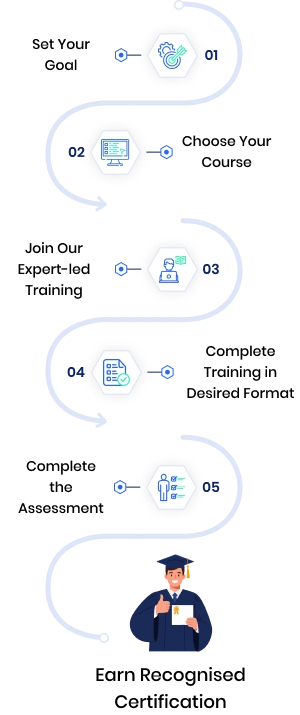Course Overview O v e r v i e w
- Course Overview
- Course Outline
- What’s Included
- What You’ll Learn
- Exam Details
ITIL® 4 Specialist: Drive Stakeholder Value Course Overview
The ITIL® 4 Specialist: Drive Stakeholder Value Course explores the customer journey, guiding professionals to engage, influence, and manage stakeholder expectations effectively. It provides insights into mapping value streams, managing demand, and fostering trusted relationships that deliver measurable outcomes.
Formal ITIL® training enables professionals to understand the importance of experience, engagement, and collaboration in achieving business success. It helps them align IT services with customer needs, improve satisfaction, and strengthen value co-creation between service providers and stakeholders.
At Training Deals, we offer ITIL® 4 Specialist: Drive Stakeholder Value training that is interactive, flexible, and industry-relevant. Our expert trainers share practical insights drawn from real-world experience, ensuring impactful learning. With affordable pricing and dedicated support, we help you enhance your stakeholder engagement capabilities.

ITIL® 4 Specialist: Drive Stakeholder Value Course Outline
Module 1: Understand How Customer Journeys are Designed
Concept of the Customer Journey
Definition: Customer Journey
Relationships Between Value Streams and Customer Journeys
Customer Journey and Service Interaction
Concept of Customer Journey
Customer Experience
User Experience
Three Aspects of the Customer and User Experience
Purpose of Identifying, Understanding, and Mastering the Customer Journey
Stages Involved in Designing an End-to-End Customer Journey and Experience
Stakeholder Aspirations
Touchpoints and Service Interactions
Mapping the Customer Journey
Personas and Scenarios
Customer Journey Maps
Example of a Customer Journey Map
Understanding the Customer Experience
Design Thinking
Marc Stickdorn’s Five Principles of Service Design Thinking
Design Thinking
Leveraging Behavioural Psychology
Design for Different Cultures
Measuring and Improving the Customer Journey
Module 2: How to Target Markets and Stakeholders?
Step 1: Explore
Understanding Service Consumers and Their Needs
Purpose of the Organisation
The ‘Golden Circle’
External and Internal Factors
SWOT Analysis
Objectives and Opportunities
Risks and Mitigation
Understanding Service Providers and their Offers
Industry Standards and Reference Architectures
Characteristics of Markets
Understanding Markets
Market Segmentation
Characteristic-Based Market Segmentation
Needs-Based Market Segmentation
Identifying and Analysing Service Consumers
Marketing Activities and Techniques
Targeting Markets
Value Propositions
Marketplace and the Marketspace
Personalising and Profiling
Targeted Marketing
AIDA Model
Brand and Reputation
Sustainability and the Triple Bottom Line
Importance of Existing Customers
Module 3: How to Foster Stakeholder Relationships?
Step 2: Engage
Communicating
Cooperation and Collaboration
Listening Modes
Service Relationship Types
Basic Relationship
Cooperative Relationship
Partnership
Engaging and Fostering Relationships in Different Environments
Building Service Relationships
Service Relationship Ladder
5 Steps of the Service Relationship Ladder
Creating an Environment that Allows Relational Patterns to Emerge
Initial Engagement Tools
Building and Sustaining Trust and Relationships
Trust and Relationship Factors
Three C’s Model Applied to a Service Relationship
Three C’s Model
How to Develop Customer Relationships?
Building of Trust and Relationships
Understanding Service Provider Capabilities
Understanding Customer Needs
Understanding Value Drivers
Value Drivers
Example of a Value Driver Framework
How Service, Services Interactions, Service Offerings, Products, and Resources are Related
Assessing Mutual Readiness and Maturity
Types of Maturity Assessment in the Engage Step
Managing Suppliers and Partners
Relationship Management: Service Integrator Activities
Supplier Management Practice
Module 4: How to Shape Demand and Define Service Offerings?
Step 3: Offer
Managing Demand and Opportunities
Patterns of Business Activity
Optimising Capacity
Capacity and Performance Management Practice
Shaping or Smoothing Demand
Pricing and Charging
Building the Customer Business Case
Building the Service Provider Business Case
How to Collect, Specify, and Prioritise Requirements from a Diverse Range of Stakeholders?
Specifying and Managing Customer Requirements
Roles and Responsibilities
Managing Requirements
Minimum Viable Product – MVP
User Stories and Story Mapping
MoSCoW Method
Weighted Shortest Job First
Methods for Designing Digital Service Experiences Based on Value-Driven, Data-Driven, and User Centred Service Design
Designing Service Offerings and User Experience
Lean Thinking
Agile Product and Service Development
User-Centred Design and Service Design Thinking
Service Blueprinting
Design for Onboarding
Approaches for Selling and Obtaining Service Offerings
Selling and Obtaining Service Offerings
Pricing
Internal and External Sales
Business Analysis Management Practice
Module 5: How to Align Expectations and Agree Details of Services?
Step 4: Agree
Agreeing and Planning Value Co-Creation
Types of Service Value Drivers
Service Interaction Method
Inherent and Assigned Characteristics of Services
How to Negotiate and Agree Service Utility, Warranty, and Experience?
From Service Consumer Needs to Agreement
SLA Content and Structure
Service Level Management Practice
Negotiating and Agreeing Service Utility, Warranty, and Experience
Module 6: How to Onboard and Offboard Customers and Users?
Step 5: Onboarding
Purposes of Onboarding and Offboarding
Onboard
Planning Onboarding
Onboarding Goals
Onboarding Scope
Examples of Consumer Resources to Onboard
Onboarding Customer and Users: Onboarding Actions
Examples of Service Provider, Service Consumer, and Supplier/Partner Onboarding Actions
Onboarding Control
Ways of Relating with Users and Fostering User Relationships
Relating to Users and Fostering Relationships
Fostering Relationships with Corporate Users
Fostering Relationships with Individual Service Consumers
Providing User Engagement and Delivery Channels
Seamless User Journey with Omnichannel Management
Examples of Omnichannel Challenges that have to be Considered by Service Providers
Enabling Users for Services
Offboarding Customers and Users
Customer Offboarding
User Offboarding
Service Catalogue Management Practice
Service Desk Management Practice
Understand How Users Can Request Services
On-going Service Interactions
Service Requests
Service Desk Interactions
When Things Go Wrong
Moments of Truth
Intelligent Disobedience
Customer and User Feedback
Challenges and Solutions for Continual Customer and User Feedback
Module 7: How to Act Together to Ensure Continual Value Co-Creation?
Step 6: Co-Create
Fostering a Service Mindset
Service Mindset for Service Provision
Methods for Triaging of User Requests
Concept of User Communities
Nurturing User Communities
Super-Users
Service Requests
Module 8: How to Realise and Validate Service Value?
Step 7: Realise
Realising Service Value in Different Settings
Tracking, Assessing, and Evaluating Value Realisation in Different Types of Service Relationships
Methods to Track and Monitor Service Value
Tracking Value Realisation
Tracking Performance, Output, and Outcome
Tracking Experience and Satisfaction
Tracking Service Usage
Assessing and Reporting Value Realisation
Evaluating Value Realisation and Improving Customer Journeys
Evaluation and Verification
Continual Improvement
Tracking, Assessing, and Evaluating Outcomes
Charging Mechanisms
Charging and Billing
Portfolio Management
Drive Stakeholder Value – Conclusion

What’s included in this ITIL® 4 Specialist: Drive Stakeholder Value Course?
- Expert-led Training Sessions by Certified Instructors
- ITIL® 4 Specialist: Drive Stakeholder Value Exam
- Digital Delegate Pack
What You’ll Learn in this Course
This course takes you from understanding stakeholder engagement principles to applying strategies that enhance value co-creation, customer satisfaction, and service experience. Each stage builds your ability to strengthen trust and deliver exceptional outcomes.
Learn how to manage and enhance customer journeys effectively
Learn to foster stakeholder relationships and align services with expectations
Learn how to design and deliver value-driven customer experiences
Learn to build transparency and trust between service providers and consumers
Learn techniques to measure, improve, and sustain stakeholder satisfaction
Learn to apply ITIL® 4 practices that drive engagement and continuous value

ITIL® 4 Specialist: Drive Stakeholder Value Exam Information
The ITIL® 4 Specialist: Drive Stakeholder Value Exam assesses delegates’ understanding of stakeholder engagement, customer experience, and value co-creation principles within the ITIL® framework. The format of the exam is as follows:
Question Type: Multiple Choice
Total Questions: 40
Total Marks: 40 Marks
Pass Mark: 70%, or 28/40 Marks
Duration: 90 Minutes
Type: Closed Book

Our Upcoming Batches
Wed 30 Sep 2026 - Thu 1 Oct 2026
Duration: 2 Days
Wed 25 Nov 2026 - Thu 26 Nov 2026
Duration: 2 Days
Fri 10 Apr 2026 - Sat 11 Apr 2026
Duration: 2 Days Leicester
Fri 10 Apr 2026 - Sat 11 Apr 2026
Duration: 2 Days Lincoln
Fri 10 Apr 2026 - Sat 11 Apr 2026
Duration: 2 Days Northampton
Wed 25 Feb 2026 - Thu 26 Feb 2026
Duration: 2 Days Nottingham
Request More Information

Corporate Training
Elevate your workforce with expert-led corporate training that enhances skills, boosts productivity, and aligns teams with your business goals.

Individuals Training
Unlock personal growth and sharpen professional skills with tailored training designed to build your confidence and career success.
Your Path to Professional Recognition
Our path is designed to guide you through each stage with clarity, support and practical learning, helping you achieve your goals with confidence.

Step Forward with Globally Recognised Certification
A recognised certification is more than a credential. It’s proof of your commitment to professional excellence, providing you with the credibility, confidence, and global reach to advance your career in exciting new directions.
Globally Certified Professionals Over Time
Career Growth
81%Certified professionals reported receiving a promotion after earning their certification.
Global Opportunities
89%Certified professionals experienced access to new career opportunities, including leadership roles and global positions.
Not able to find what you are looking for
Our experts will guide you to the right course from thousands worldwide: tailored to your goals.
Frequently Asked Questions
It is an advanced-level certification that focuses on stakeholder engagement, customer experience, and value co-creation throughout the service value journey.
It helps professionals enhance communication, build trusted relationships, and align IT services with business and customer expectations for improved value delivery.
It is ideal for IT Professionals, Service Managers, and individuals involved in customer experience, relationship management, or stakeholder engagement roles.
Yes, ITIL® practices are widely used in IT, finance, healthcare, education, and other industries to enhance collaboration and service excellence.
It equips learners with tools and frameworks to manage customer journeys, enhance engagement, and deliver value-driven service experiences.
What Our Customers Say About Us
 Matthew Sullivan
HR Business Partner
Matthew Sullivan
HR Business Partner
Our HR team registered for the Change Management Foundation & Practitioner Training Course, and it couldn’t have been more valuable. The team gained practical frameworks to guide employees smoothly through transitions with confidence.
 Olivia Barrett
Operations Manager
Olivia Barrett
Operations Manager
Our operations staff completed the Lean Six Sigma Green Belt Training Course, and it has been transformative. We can now identify inefficiencies quickly, and the tools we learned are already improving performance across the team.
 Benjamin Foster
Product Manager
Benjamin Foster
Product Manager
Our product team took part in the Agile Project Management Foundation & Practitioner (AgilePM®) Training Course, and the difference is remarkable. We’re now more adaptive, collaborative, and efficient in managing change.
 Lucy Harper
IT Support Lead
Lucy Harper
IT Support Lead
Our IT support unit attended the ITIL® 4 Foundation Training Course, and the results have been impressive. Processes are smoother, collaboration has improved, and the team finally speaks a common language of service management.
 Edward Clarke
Programme Manager
Edward Clarke
Programme Manager
We joined the PMP® Certification Training Course as a leadership group, and it was outstanding. The trainer made every concept practical, and the exam preparation resources helped the whole team feel ready to tackle complex projects.
 Amelia Rhodes
Project Officer
Amelia Rhodes
Project Officer
Our project office completed the PRINCE2® Foundation & Practitioner Training Course, and it has brought real clarity to how we manage projects. The trainer’s examples were excellent, and the team now follows a structured approach with confidence.

























